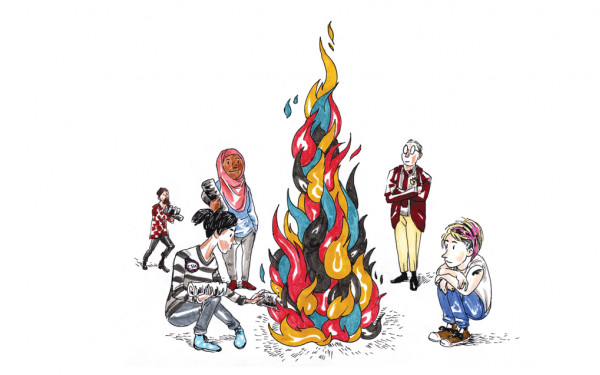How Will $23 Million Address Sexual Violence on Quebec Campuses?
Throwing Money at the Problem Might Not be Enough
Sexual harassment and assault on campus is a pervasive issue. Not only within Concordia, but on provincial and national levels, too.
We seem to talk about it a lot, too. We’ve watched The Hunting Ground. We’ve engaged in social media frenzies, most recently the #metoo movement, and before that,
#beenrapedneverreported. We say we understand there’s a problem, but no matter what we do, no matter how it’s framed, it still seems like it’s not being taken seriously enough.
Of almost 9,300 people who work or study at Université du Québec’s six campuses, over 3,400 respondents reported experiencing a form of sexual violence by someone connected to their university.
We also know that about one in four women experience sexual assault while they’re in college or university. For men, it’s about six per cent. And about one quarter of trans or non-conforming students will also experience a form of sexual assault. These numbers have a tendency to increase for marginalized peoples, especially Indigenous women, women of colour, and those with mental illness or disabilities—they’re all four times more likely to experience sexual violence. But of course, these numbers come from those who are willing to disclose their experiences, so it’s likely the real numbers are much higher.
In August, shortly before students headed back to school, Higher Education Minister Hélène David and the Quebec Government announced they would be funneling $23 million into all post-secondary institutions across the province over five years, with one goal in mind: to combat sexual violence.
While administrations across the province hooped and hollered in joy, student groups and people working on the ground questioned how these funds will affect change.
And as such, the reviews are mixed.
“It’s a step in the right direction,” explained Jennifer Drummond, Concordia’s Sexual Assault Resource Centre coordinator.
“But when it’s divided that many ways and over five years…” She paused. “It would be great if it was a lot more.”
Concordia Student Union Student Life Coordinator Leyla Sutherland and Academic and Advocacy Coordinator Asma Mushtaq, who spoke together, feel the policy is a welcome investment, regardless.
“[The Quebec government] talks about prevention, as well as support which is an important second part to any approach to sexual assault policy,” said Sutherland.
Mushtaq, who works at the CSU Legal Information Clinic, is currently working on protocols on how to internally review parts of policy, specifically Concordia’s, that have loopholes. This includes loopholes in the sexual assault policy that came out in 2016. She believes that these policies “should be reviewed with a more intersectional lens and [intersectional-]based approach.”
Other Montreal students have their reservations. Connor Spencer, Student’s Society of McGill University’s vice president external, said that she’s hesitant and wary of the new policy announcement because of her experience at public consultations.
PROBLEMS FROM THE GET-GO
The Quebec government announced, following a string of break-ins and assaults at University of Laval, that it would hold public consultations around the policy starting October 2016. Those consultations ran until March 2017.
During these announcements, David said that the consultations would bring together government, institutions, student groups, and organizations to discuss methods of prevention and support.
These meetings were well-intentioned, explained Spencer, but they missed the mark.
“They were very problematic,” said Spencer, who attended the Montreal consultation at in April. “The space was not accessible to survivors, and survivors were not invited.”
Despite claims that the consultations would incorporate students, she said that barely any students were invited.
“It was less than ten students in a room full of middle-aged white people talking about how they were going to deal with sexual assault, and kind of patting themselves on the back.”
Some students crashed the party, though. Survivors from the McGill chapter of Silence is Violence disrupted the meetings, Spencer detailed, and proceeded to give their testimonies.
She feels that the public consultations were inaccessible in other basic ways as well. No English translations were provided for the meeting, which was held in French. Spencer said she found herself in the awkward position of also trying to translate Silence is Violence members’ testimonies from English to French to a person sitting next to her.
“The only way you could provide feedback [at the consultation] was to stand up and speak into a microphone in front of two hundred people,” she added.
“So there were problems.” On top of that, Spencer said that there was only one group that works with survivors invited to the space. “It’s great that they got that one, but it was not enough. The only reason I got into that room was not as someone who had worked with survivors but as an incoming student executive.”
A QUESTION OF DISTRIBUTION
The Minister of Higher Education said that to combat sexual violence on campus, the Quebec Government will invest $23 million among all post-secondary institutions, over five years, in the province. This includes CEGEPs as well as universities.
There are questions about how the funds will be distributed.
Sutherland and Mushtaq agree that allocation should “be done in consultation with stakeholders and individuals at the universities, including survivors.” She reiterated that these discussions should acknowledge the specific circumstances of each institution, be that student population, their biggest concerns, and what loopholes exist in policies.
“We don’t really know what the $23 million is going towards right now, and it would be good to have a breakdown and see what exactly it is that is going to be required of universities,” said Spencer.
The province has yet to detail how the money will be distributed. It’s unknown whether it will be allocated equally or based on need.
Some institutions, like McGill and Concordia, already have resources centres, student groups, and policies based around prevention and support. To distribute money evenly would “ignore some of the realities of where each group is at,” noted Sutherland. “Funds should be distributed to reflect that.”
“We’re lucky as a large research-based institution to have those kinds of resources available,” explained Spencer. “But in regional universities… That funding from the province could be what decides whether or not they even have staff dedicated to dealing with sexual violence on campus.“
If divided equally among the more than 70 public colleges and universities in the province, funding could be less than $63,800 annually per institution. But the CSU executives think assessments could help, along with looking at what tactics have worked at Concordia and McGill, and how they could be applied or revamped at other schools.
Spencer said the numbers don’t look so bad on paper, but it’s hardly enough for university centres that support themselves already, let alone “big enough to make a difference in the regional universities for actually creating support systems that don’t yet exist.”
Drummond suggested that the funds could potentially go towards research projects, campaigns, or even creating online workshop modules.
“But it’s not enough to hire someone,” she said. Until last year, Drummond was the SARC’s only full-time staff member. “I don’t think, in terms of services for survivors, it will have a huge impact.”
“It’s not enough to hire someone. I don’t think, in terms of services for survivors, it will have a huge impact” —Jennifer Drummond
UNIVERSITY POLICY HOLES
At Concordia, Sutherland and Mushtaq are worried about loopholes.
“It’s often the case that there is little recourse within the university or legal context, depending on the loopholes that exist in policy. It’s extremely important that these processes be survivor-centric,” said Sutherland.
Concordia’s Sexual Assault Policy came into effect in May 2016, and McGill’s in November 2016 after student groups disputed the policy for not doing enough.
Concordia’s administration has shown support Concordia’s Sexual Assault Resource Centre, most notably with the relocation of the centre itself, from what was once an unmarked office on the third floor of the GM building to a sunny and spacious multi-room office on the sixth floor of the Hall.
Similarly, Spencer said McGill’s policy also needs some work.
“The main problem is that it’s a stand-alone policy, and relies on the Code of Student Conduct to implement any disciplinary measures,” meaning you cannot pursue a complaint against a faculty or staff member through that policy.
“The first sentence of the policy says that ‘This applies to all Members of the University.’ That’s a lie,” she continued.
Additionally, she explained that those disciplining in accordance to McGill’s code aren’t trained for dealing with sexual violence. “They are trained to discipline people for plagiarism.”
Concordia’s policies are better in some ways, said Mushtaq, “but there is always room for growth and improvement, especially when vulnerabilities are concerned.”
She continued, “We’re talking about people who are informing the policies, and with each voice that is added, it will amplify that.” She advocates for approaches that are inclusive of trauma and people’s individual experiences, hoping that the results from there can “only get better.”
A TOP-DOWN APPROACH
For Spencer, the main issue with the policy making is the “top-down approach” that Quebec has taken to addressing sexual assault on campus. She suggests that, depending on what is stated in the forthcoming law later on, a new set of consultations can be launched.
“Specifically with students and survivors, making sure that those voices are heard when they critique what is supposed to influence their everyday lives on campuses.”
She also worries that the government might attempt to impose new and under-funded structures, as opposed to supporting networks that already exist by means of student leadership.
“In the face of administration not taking care of its students, often students step up, and you find that on every campus… Why not instead fund the structures that have already been created out of a need of a community? That’s something I would like to see.”
KEEP THE CONVERSATION FLOWING
Listening to feedback will play a crucial role in how these kinds of policies will affect those they are geared towards. Hopes that the Quebec government will re-evaluate the situation after the policy and bill are implemented are high.
Having a policy in place is great, but as Sutherland said, “It’s not an endpoint of the process.”
Especially when there is still so much work to do.
Sexual violence isn’t a new issue, but it’s only now that people are starting to pay attention. It’s almost inescapable. With post after post from survivors sharing their stories, our feeds overflow with allegations against Hollywood bigshots or members of our own communities.
Maybe this will be a turning point. Maybe this policy will incite change—whether directly through its laws or indirectly through the reaction of Quebecers.
The danger perhaps is that another policy will be put into motion with no follow-up to come afterwards.
“There should be a plan in place to look at these policies and see if they’re still upholding the safety and the dignity and the well-being of students,” Sutherland points out.
And if we’re to do that, it’s going to take a lot more than $23 million. It’s going to take energy, time and dedication. But the value in finding solutions to this issue is worth far more than the money.






_600_375_90_s_c1.jpg)